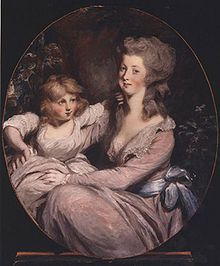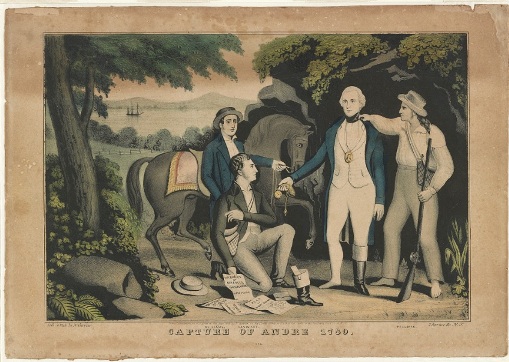The Arnold Family - England to America
A Patriot and A Traitor – Cousins
Last month, we began the exploration of Benedict Arnold’s military career – one that led both to great admiration from General George Washington and to eventual disgrace as America’s most infamous traitors. This month we shall attempt to understand the forces at play in his life. We shall also trace the distant relationship of Benedict Arnold to our family. Through his Westcott ancestral line, we may ultimately find a closer relationship than now known.
MILITARY CAREER, cont.:
In his first outing in command of troops in March of 1775, Benedict, as Captain, commanded a unit tasked to gain control of Fort Ticonderoga. Although successful, we find our young Benedict was frustrated after losing his personal battle with Ethan Allen who had marched from Massachusetts with his rowdy troop of Green Mountain Boys. This was a militia unit formed in the 1760’s in a back area bounded by the British provinces of New York and New Hampshire, an area which would later become the State of Vermont. It was a family affair with units commanded by Ethan and by members of his extended family. The troops held deep ties and loyalty to Ethan Allen’s family and to him, personally.
“Arnold was surprised and a little angered because Ethan Allen did not care if Arnold had permission from the Committee of Safety and Arnold couldn't talk Allen out of relinquishing command. Arnold had to concede to accompanying Allen and his rowdy, rough and tumble fighters. On May 10, 1775, they surprised the British garrison and the Green Mountain Boys celebrated by invading the rum stores of the British and getting totally sloshed. They virtually ignored Benedict Arnold except when they were teasing and jeering him. Arnold had an argument with Colonel James Easton, who was to deliver the missive announcing the victory of the capture to Massachusetts. In his regimental memorandum book, Arnold wrote:
“I took the liberty of breaking his head, and on his refusing to draw like a gentleman, he having a hanger [short sword] by his side and a case of loaded pistols in his pocket. I kicked him very heartily and ordered him from the Point immediately.”
(SOURCE: http://www.ushistory.org/valleyforge/served/arnold.html)
The enmity between Ethan Allen, his related commanders, and Colonel James Easton was but one festering wound upon Benedict Arnold’s soul. He may have found quick satisfaction in manhandling Colonel Easton, but that was short-lived. The two strong-willed and bullheaded men, Allen and Arnold, would begin planning the first assault on British troops garrisoned in Canada. Meanwhile, Fort Ticonderoga was being held by their dual command.
“Easton returned from his mission to Massachusetts while Arnold and Allen were planning the Canadian Invasion. Easton had done his best to diminish Arnold's participation in the capture of Ticonderoga and the two were arguing once more. The hot-tempered Arnold soon had some more people to fight with: Connecticut governor Johnathan Trumbull appointed Colonel Benjamin Hinman to command the Fort. Ethan Allen relinquished his command. Arnold did not, instead threatening to sail two ships under his command directly to a nearby British outpost and surrender them. Hinman then enlisted the treasonous Arnold's soldiers, took command of his ships, and dissolved his command. Completely affronted, Arnold went to Albany and there sent off a statement of the situation at Ticonderoga to the Continental Congress.
“Arnold had been caught in the middle of the political machinations of Connecticut and Massachusetts, both vying for the glory that would accompany the capture of the British stores at Fort Ticonderoga. When Massachusetts acquiesced to Connecticut's preeminence in the territory, Arnold most certainly felt abandoned.”
(SOURCE: http://www.ushistory.org/valleyforge/served/arnold.html)
Here we witness the first evidence of Benedict Arnold’s thought process which would presage his ultimate treasonous acts. In a fit of pique, rather than think calmly and enlist the aid of those who actually respected and supported him, he rashly threatened an act certain to bring down wrath upon him.
We now know that upon returning home, Benedict would learn of the death of his young wife. Coupled with the anger still fomented by his embarrassing and frustrating confrontation following his successful taking of Fort Ticonderoga, was the anguish of his deep personal loss, topped by the inability of the Continental Army to remunerate him properly for his personal expenditures in support of the cause. The Massachusetts Committee of Safety repaid him only a small portion of his total bill, nowhere near the total. It would be some time before he was fully recompensed.
The Siege of Montreal:
General George Washington had been much impressed by Benedict Arnold’s daring actions and saw value where others merely saw arrogance. He let it be known he wanted Benedict to take a commanding role in the campaign which would be led by Gen. Philip Schuyler. Benedict’s long years of trade with the Quebecois made his knowledge of the people and the terrain valuable. In advance of the trek Benedict Arnold sought to gain some knowledge from a long-time acquaintance, John Dyer Mercier. Mercier made a most unfortunate decision. He handed off Benedict’s letter to two Abenaki tribesmen who were in concert with John Hall, a French-speaking British deserter. Somehow that letter fell into the hands of the British command who, now alerted to the impending invasion, had time to buttress their garrison. The entire campaign seemed fated from the start. Of the 1,100 troops marched northward by Arnold, only 600 made the trip due to the horrific cold of the winter, disease, and starvation. Upon arrival, they found a much larger defense amassed in advance. The weather also did not help. Rain poured down upon the troops, a cold and chilling rain. Montgomery was killed, Benedict suffered his first leg wound, and Daniel Morgan was called upon to salvage what he could of the effort. In spite of Morgan’s heroic efforts, the Americans were ultimately forced to surrender. From his sickbed, Benedict refused to surrender – “bellowing commands” to his troops, not merely reluctant but determined not to leave absent triumph. It was to no avail, but word of his actions reached Washington who marked this up in his favor as well. Washington named Benedict Arnold the rank of Brigadier General.
We touched upon the rough and tumble nature of Benedict Arnold’s character in last month’s column. Here again that came to the forefront:
“Arnold became involved in a dispute with Moses Hazen, an officer under his command, whom he accused of insubordination for failing to carry out Arnold's orders to seize supplies from Merchants in Montreal during the American army's retreat. Hazen issued counter-charges against Arnold for issuing the order to plunder in the first place. Hazen was acquitted at his court-martial, and Arnold was ordered to apologize, an order he indignantly refused. General Horatio Gates intervened on behalf of Arnold, who was given charge of a small fleet of ships and ordered to Ticonderoga.”
Benedict Arnold was mounting up enemies among the officers with whom he would be tasked to fight the cause of America’s revolution. The very attributes which made him a strong commander in battle were negative faults in his personal interactions. These feuds would cost him a most desirable promotion to Major General. While he defended multiple complaints brought by his peers and senior officers, Benedict watched junior officers being promoted ahead of him to Major General. He was embittered. Once again, his admirer and defender, General George Washington, would intervene behind the scenes to investigate why he had not been consulted in connection with the promotions handed out by Congress.
This promotion, however, was granted without the seniority both Washington and Arnold felt he deserved. He would be standing in an inferior capacity to many junior officers who served under his command previously. He sent a letter of resignation to Washington. Washington, unbeknownst to Arnold, was working behind the scenes to secure a position of command on a second Siege of Montreal. He refused Arnold’s resignation, instead placing him in a substantial role in the second Siege of Montreal.
In a letter to John Hancock in Congress, Washington defended Arnold thusly:
“If General Arnold has settled his Affairs & can be spared from Philadelphia, I would recommend him for this business & that he should immediately set out for the Northern department. He is active-judicious & brave, and an Officer in whom the Militia will repose great confidence. Besides this, he is well acquainted with that Country and with the Routs and most important passes and defiles in it. I do not think he can render more signal services or be more usefully employed at this time than in this way-I am persuaded his presence & activity will animate the Militia greatly & spur them on to a becoming conduct. I could wish him to be engaged in a more agreeable service-to be with better Troops, but circumstances call for his exertions in this way, and I have no doubt of his adding much to the Honors he has already acquired.”
When he learned of this opportunity, Arnold asked to put his resignation on hold. He immediately took off for the north. On August 8, Congress voted not to reinstate Arnold's seniority and he would never forgive them for the slight.
Arnold exhibited an innate strategic sense in battle. He crossed horns with Generals Schuyler and Gates on more than one occasion, even when his tactical plans were accepted and proven successful. Again, the hostility he faced reared its ugly head when his contributions to both strategic plans and tactical execution failed to be mentioned in the official reports to Congress. He exhibited bravery on more than one occasion, even when injured. These efforts failed to be recognized by those whose disapprobation of him surmounted any level of respect they might otherwise have felt.
Even after Gates relieved Arnold of his command for insubordination, Arnold charged onto the field of battle astride his horse, reinvigorating his troops and others at Bemis Heights. After leading two separate onslaughts, Arnold along with Daniel Morgan’s troops were able to push open the center of the British line, ensuring ultimate success. In the final assault, Arnold’s horse was shot and it fell upon the very leg Arnold had injured in prior battle. The bravado of the Continental troops was so great, Burgoyne surrendered not ten days later. Now, the French were willing to enter the fray in support of the American rebel’s cause. Benedict “Arnold’s actions, perhaps more than any other officer there, led to the American’s success.”
Even though Arnold’s seniority was later restored, the damage had been done. He was now forever lame, had been discredited by his superior officers, ignored by members of Congress, and was now a widower with young children and felt the sting of being alone to raise them. He returned home with enmity in his heart.
PERSONAL FACTORS:
While recuperating from his wounds at his home in Philadelphia, 38 year old Benedict met and began wooing Margaret “Peggy” Shippen, the youngest daughter of Judge Edward Shippen. A mere 18 years of age, Peggy was vivacious, strong-willed, and deeply involved in the Loyalist’s cause. They wed in April of 1779.

The Shippen family was upper crust society, wealthy, educated, and well respected. Arnold was once again thrust into a life of social status, but without the means to support the lifestyle. He, once again, resorted to the old street savvy ways. He engaged in real estate speculation, a capital-intensive industry. In support of his needs, Arnold began utilizing government assets as his own. He used his position to approve the use of a ship and later invested in it in clear contravention of propriety. He was brought up on charges and court-martialed in June of 1779.
By this time, he had already begun negotiating with the British to sell military secrets and to use his position to weaken the defenses of West Point. He had been given command in spite of his peer’s opposition. Now he bartered that command for filthy lucre! Through the intermediary Major John Andre, a friend and possible former lover of now wife Peggy Shippen Arnold, Benedict funneled information to the British in return for money. He even gave vital information on the movements of his old mentor George Washington.
In a letter dated 12 July 1780, directed to Major John Andre and Sir Henry Clinton, Benedict outlined critical information about American troop movements, specifically a plan of disinformation revealed to Benedict by his old friend and trusting mentor, George Washington. Benedict shamelessly betrayed Washington, providing full and complete information that could have brought death to General Washington. In the letter, he also revealed this was not the first information provided the Brits for money. He apparently reiterated his prior betrayals as a reminder of his monetary value to them. In the final paragraphs of that letter, Arnold reveals his motivations and belief as to the ultimate failure of the Revolutionary cause:
“He disclosed his general feeling about the impact of the war on American resolve and morale. He thought that Americans were tired of the war and would give up soon if they did not see any substantial benefit. He thought that the last few struggles were futile and showed American weakness and discouragement. Furthermore, Arnold again emphasized that he expected substantial and urgent payment for his services.”
(SOURCE: http://clements.umich.edu/exhibits/online/spies/stories-arnold-2.html)

When Benedict Arnold learned of the capture of Major John Andre and the discovery of his betrayal, he escaped aboard the very ship that had brought Andre to American shores, the Vulture. His betrayal must have brought to Benedict the ultimate sting of defeat. As reported by US History.org (see Source information above):
“Arnold defected to the British and received substantial remuneration for his defection. These included pay, land in Canada, pensions for himself, his wife and his children (five surviving from Peggy and three from his first marriage to Margaret) and a military commission as a British Provincial brigadier general.
The British provided handsomely for Arnold, but never completely trusted him. He was never given an important military command. They moved to London where he found no job, some admiration and even some contempt. He moved his family to Canada where he reentered the shipping business. The Tories there disliked him and had no use for him, and eventually he returned his family to London. When the fighting began between France and England, he tried again for military service, but to no avail. His shipping ventures eventually failed and he died in 1801, virtually unknown, his wife joining him in death three years later.”
OUR RELATIONSHIP TO BENEDICT ARNOLD:
Gen. Benedict Arnold V, The Traitor (1740 - 1801)2nd great-nephew of husband of 8th great-aunt
Benedict Arnold III (1683 - 1761)Father of Gen. Benedict Arnold V, The Traitor
Benedict Arnold II (1641 - 1727)Father of Benedict Arnold III
Damaris Westcott (Arnold) (1620 - 1679)Mother of Benedict Arnold II
Stukely Westcott (1592 - 1677)Father of Damaris Westcott (Arnold)
Jeremiah Westcott (1633 - 1686)Son of Stukely Westcott
Eleanor England (Westcott)(1643 - 1692)Wife of Jeremiah Westcott
Hugh Parsons (1612 - 1684)Father of Eleanor England (Westcott)
Hannah Parsons (1646 - 1685)Daughter of Hugh Parsons
Thomas Matteson (1673 - 1739)Son of Hannah Parsons
Mary Matteson (1651 - 1701)Daughter of Thomas Matteson
William (of Deerfield) Joslin Col. (1701 - 1771)Son of Mary Matteson
William "P.R." Joslin (1757 - 1846)Son of William (of Deerfield) Joslin Col.
William (James) Riley Joslin (1792 - 1871)Son of William "P.R." Joslin
William Henry Joslin (1837 - 1921)Son of William (James) Riley Joslin
James Arthur Joslin (1874 - 1956)Son of William Henry Joslin
Lena May Joslin (1918 - 2010)Daughter of James Arthur Joslin
Your author and her siblings - the four Daughters of Lena May Joslin Carroll.
Interestingly, our relationship to General Benedict Arnold V, the Traitor, may be closer. By DNA testing, we discovered our maternal uncle on the Joslin line had his closest match to one Westcott Campbell Joslin, Sr. Your author is still researching that line to determine our Shared Ancestor and, perhaps, break down the brick wall that still exists between William “P.R.” Joslin and the Colonel William (of Deerfield) Joslin. For it is our belief that P. R. was the grandson, not the son. When and if we chip away successfully at that wall, it is believed the Shared Ancestor with Westcott Campbell Joslin will provide the parental line that is missing – that ONE generation. Clearly, Westcott was named for his Westcott relatives, but we have yet to ascertain exactly how that interrelates to our line.
Next month, we cover the Arnold Family – the heroes. That line intersects directly with my husband’s, Rod Cohenour. It should be interesting!






No comments:
Post a Comment